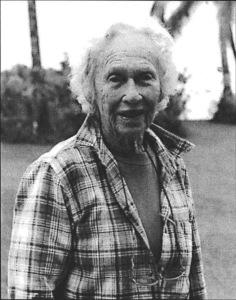Kapua Wall Heuer

Tsunamis Remembered: Oral Histories of Survivors and Observers in Hawai‘i
Life history interviews with individuals who witnessed and survived tsunamis-particularly the 1946 and 1960 disasters on the Big Island of Hawai'i. Thirty individuals-mostly residents of Hilo and Laupahoehoe-recall their experiences before; during, and after the 1946 and 1960 tsunamis which were arguably the most destructive natural disasters in modem Hawaiian history.
Kapua Wall Heuer was born February 1, 1912 in Kainaliu, Kona, Hawai'i. She was the youngest child of Allen Wall and Christina Lilinoe Roy Wall. Heuer's maternal grandparents were William F. Roy, a Scotsman who arrived in Hawai'i in 1860, and Eliza Davis Roy, a native Hawaiian. Together, they took up ranching in Kona. Growing up in Waihou, an area mauka of Kainaliu town, Heuer lived the ranching lifestyle. She rode horses, and learned to rope, herd, and ship cattle. Beginning in 1918, Heuer spent most of her time in Honolulu attending Punahou School. She would return to Kona for vacations. After graduating from Punahou in 1932, she remained in Honolulu and worked for Hawai'i Meat Company. Later, she managed the James Robinson estate. In 1936, Heuer, along with her first husband, Roger Burke, moved to 'Ola'a on the Big Island. Four years later, they moved to Hilo and lived on Pukihae Street Burke and Heuer were divorced in 1954 and in 1958 Heuer married Henry W. Heuer, a captain for Matson Navigation Company. Heuer, who was interviewed in the patio of her Hilo home overlooking Hilo Bay, recalled getting her children ready for school the morning of April 1, 1946, when her daughter noticed that the water, in the bay had receded. Because the house sits on a hill several feet above the shore, the house was not damaged, although water did reach the backyard. From her vantage point, Heuer saw people and debris being swept out into the open ocean. She later went to Keaukaha and helped in rescue efforts there. Heuer still lives in Hilo today, but maintains her Kona ranching roots. She raised two daughters and has sixteen grandchildren and several great-grandchildren.
Scope and Content Note
A Kona-born woman depicts life on a ranch, including the branding and shipping of cattle. She recalls her father and his fatal accident in a cattle pen. Jobs at Hawaii Meat Company and James Robinson estate are described. Although her home was not damaged in the 1946 tsunami, she tells of the destruction of neighboring homes, loss of life, and tales of survival.
Program Note:
This interview is part of the Center for Oral History's project Tsunamis Remembered: Oral Histories of Survivors and Observers in Hawai‘i. Interviews from this project are available in the Center's ScholarSpace open access repository.
The Center for Oral History (COH), in the Department of Ethnic Studies at the University of Hawaiʻi at Mānoa, collects, documents, preserves and highlights the recollections of Native Hawaiians and the multi-ethnic people of Hawaiʻi. It produces oral histories and interpretive historical materials about lifeways, key historic events, social movements and Hawaiʻi’s role in the globalizing world, for the widest possible use.
Please Note: The oral histories in this collection are protected by copyright and have been created for educational, research and personal use as described by the Fair Use Doctrine in the U.S. Copyright law. Please reach out Voices@noaa.gov to let us know how these interviews are being used in your research, project, exhibit, etc. The Voices staff can help provide other useful resources related to your inquiry.
The NOAA mission is to understand and predict changes in climate, weather, oceans, and coasts, to share that knowledge and information with others, and to conserve and manage coastal and marine ecosystems and resources. The Voices Oral History Archives offers public access to a wide range of accounts, including historical materials that are products of their particular times, and may contain offensive language or negative stereotypes.
Voices Oral History Archives does not verify the accuracy of materials submitted to us. The opinions expressed in the interviews are those of the interviewee only. The interviews here have been made available to the public only after the interviewer has confirmed that they have obtained consent.
